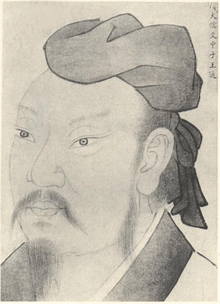Wang Tong (philosopher)
Wang Tong (王通) (584-617), style name Zhongyan (仲淹), posthumous name Master Wenzhong (文中子) was a Sui Dynasty official, writer and Confucian philosopher.

Life
Wang Tong was born in Longmen County (modern day Tonghua Township, Wanrong County, Shanxi province) in 587.[1]
Wang Tong was a great student and somewhat of a child prodigy, with legend saying he starting teaching at the age of 15. In 602, he received political office and was made Secretary of Shuzhou.[2] In the year 603, he submitted a memorial to Emperor Wen of the Sui Dynasty entitled the "12 Point Plan for Great Peace",[3] advocating for an overhaul of the political system. When his proposals were rejected, Wang Tong lost confidence in the Sui court and resigned his post. Leaving Chang'an, he retired to the Hefen region and dedicated himself fully to teaching. During this time, he also wrote numerous works on Confucian philosophy. His most famous (and only surviving) work is the philosophical treatise Explanation of the Mean (Zhongshuo, 中说),[4] which was complied by his sons shortly after his death and was written in the same style as the Analects.
The Explanation of the Mean covers many topics, but is mostly focused around the virtue in having moderation in all things. Tradition and history are very important, but not as a means of social control; rather, they are primarily seen as a means to understand how one should live righteously live in modern times. Wang Tong also advocated for a return to Pre-Qin Confucianism, seeing Han Dynasty Confucianism as borrowing too much from Legalism.[5]
Wang Tong is the grandfather of Wang Bo, famous poet and one of the Four Paragons of the Early Tang.
Influence
Wang Tong has raised controversy among Confucianists. The writer saw himself as another Confucius and often wrote in ways that purposely imitated the Confucian Classics, angering many who saw this as hubris. Some detractors in the Ming and Qing dynasties even questioned his very existence, pointing out his youth and some dating discrepancies. For the most part, however, Wang Tong has a firm place in the Confucian canon. His work on political philosophy and the master-subject relationship has been said to have been influential during the early Tang Dynasty, especially during the Zhenguan era (貞觀之治) of Tang Taizong, seen as a golden era in Chinese history. Later, eminent Ming Dynasty Confucian Wang Yangming praised Wang Tong in his Instructions for Practical Living[6] and defended his emulation of the Confucian Classics, saying that "Master Wenzhong was a worthy scholar" and that famous Neo-Confucian Han Yu was "vastly inferior to Master Wenzhong".[7]
References
Notes
- People's Political Consultative Conference Cultural Weekly:王通的价值———为《山西万荣县通化村史》序
- People's Political Consultative Conference Cultural Weekly:王通的价值———为《山西万荣县通化村史》序
- 《太平十二策》
- Explanation on the Mean (中說)
- People's Political Consultative Conference Cultural Weekly:王通的价值———为《山西万荣县通化村史》序
- Chuanlixu,传习录
- Ivanhoe, Philip (2009). Readings from the Lu-Wang school of Neo-Confucianism. Indianapolis: Hackett Pub. Co. p. 149. ISBN 0872209601.
Bibliography
- Ivanhoe, Philip (2009). Readings from the Lu-Wang school of Neo-Confucianism. Indianapolis: Hackett Pub. Co. ISBN 0872209601.
- People's Political Consultative Conference Cultural Weekly:王通的价值———为《山西万荣县通化村史》序
Further reading
- Chinese Wikisource has the full text of the Explanation on the Mean (中說)
- http://www.silkqin.com/09hist/qinshi/wangtong.htm
- http://www.chinaknowledge.de/Literature/Diverse/zhongshuo.html